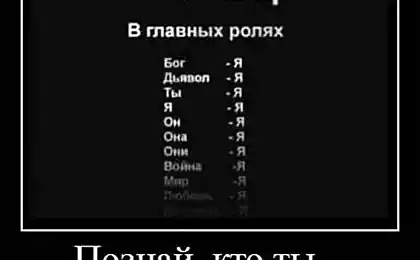162
"I have no talents": How blindness to one’s own abilities became a twenty-first-century epidemic
8 Unobvious Ways to Find Your Superpowers (Even If You’re Sure They’re Not)

A 2023 Stanford study found that 68 percent of people describe their real talents as “ordinary skills,” while 42 percent say they don’t have unique abilities. Neuropsychologists call this the Cognitive Blindness Syndrome, where the brain filters its own accomplishments as the “norm.” We decipher the self-diagnostic methods used by HR specialists Google and McKinsey.
1. Analysis of "random victories"
Professor Carol Dweck, in her book Flexible Consciousness, found that we attribute 93% of our successes to external factors (“lucky,” “helped”). Technique for restoring justice:
2. Reverse sabotage method
Psychotherapist Caroline Leeds found that our weaknesses are often hypertrophied strengths. Examples:
What annoys Hidden power I'm too meticulous System thinking Never mind my own business Leadership potential
3. Shadow resume
The MIT Media Lab experiment:

4. Timekeeping of pleasure
A study in the Journal of Positive Psychology: Flow-inducing activities indicate innate abilities. Fix:
5. The Broken Puzzle Technique
Cognitive psychologist Anders Erickson recommends:

6. Digital footprint analysis
The University of Toronto AI algorithm analyzes:
7. Playing "alien biography"
Exercise from art therapy:
8. Method of paradoxical comparison
Nobel laureate Daniel Kahneman advises:
“Strengths are not something that comes easily. It’s what makes struggle meaningful. – Emily Esfahani, The Power of Meaning
The material is prepared using data from neuropsychology and behavioral economics. For in-depth study: The Illumination by Malcolm Gladwell, The Flow by Michael Csikszentmihalyi. The techniques were tested in Harvard Business Review and APA studies.

A 2023 Stanford study found that 68 percent of people describe their real talents as “ordinary skills,” while 42 percent say they don’t have unique abilities. Neuropsychologists call this the Cognitive Blindness Syndrome, where the brain filters its own accomplishments as the “norm.” We decipher the self-diagnostic methods used by HR specialists Google and McKinsey.
1. Analysis of "random victories"
Professor Carol Dweck, in her book Flexible Consciousness, found that we attribute 93% of our successes to external factors (“lucky,” “helped”). Technique for restoring justice:
- Make a list of 20 achievements in 5 years – from making the perfect omelet to successful negotiations
- Identify repetitive patterns: What skills provided them?
2. Reverse sabotage method
Psychotherapist Caroline Leeds found that our weaknesses are often hypertrophied strengths. Examples:
What annoys Hidden power I'm too meticulous System thinking Never mind my own business Leadership potential
3. Shadow resume
The MIT Media Lab experiment:
- Ask 5 people to describe you in three verbs.
- Compare it to your self-esteem
- Find discrepancies – there are hidden blind spots of talent

4. Timekeeping of pleasure
A study in the Journal of Positive Psychology: Flow-inducing activities indicate innate abilities. Fix:
- At what point do you lose track of time?
- What tasks energize rather than drain?
5. The Broken Puzzle Technique
Cognitive psychologist Anders Erickson recommends:
- Think back to 3 difficult situations where you found non-obvious solutions.
- Highlight the skills used – these are your “emergency competencies”

6. Digital footprint analysis
The University of Toronto AI algorithm analyzes:
- Which posts do you most actively comment on?
- What topics trigger an emotional response?
- What queries do you often search for on Google?
7. Playing "alien biography"
Exercise from art therapy:
- Write about your achievements from a third person
- Read it out loud – the brain will perceive it as “alien story” and remove the filters
8. Method of paradoxical comparison
Nobel laureate Daniel Kahneman advises:
- Compare yourself not with professionals, but with beginners.
- What do you do faster or easier than others? It's your "neurological privilege."
“Strengths are not something that comes easily. It’s what makes struggle meaningful. – Emily Esfahani, The Power of Meaning
The material is prepared using data from neuropsychology and behavioral economics. For in-depth study: The Illumination by Malcolm Gladwell, The Flow by Michael Csikszentmihalyi. The techniques were tested in Harvard Business Review and APA studies.
6 Reasons Why You're Sad, Even If Life Is All Right
7 Unobvious Reasons Why You Stay In Unhappy Relationships (and How to Fix It)























